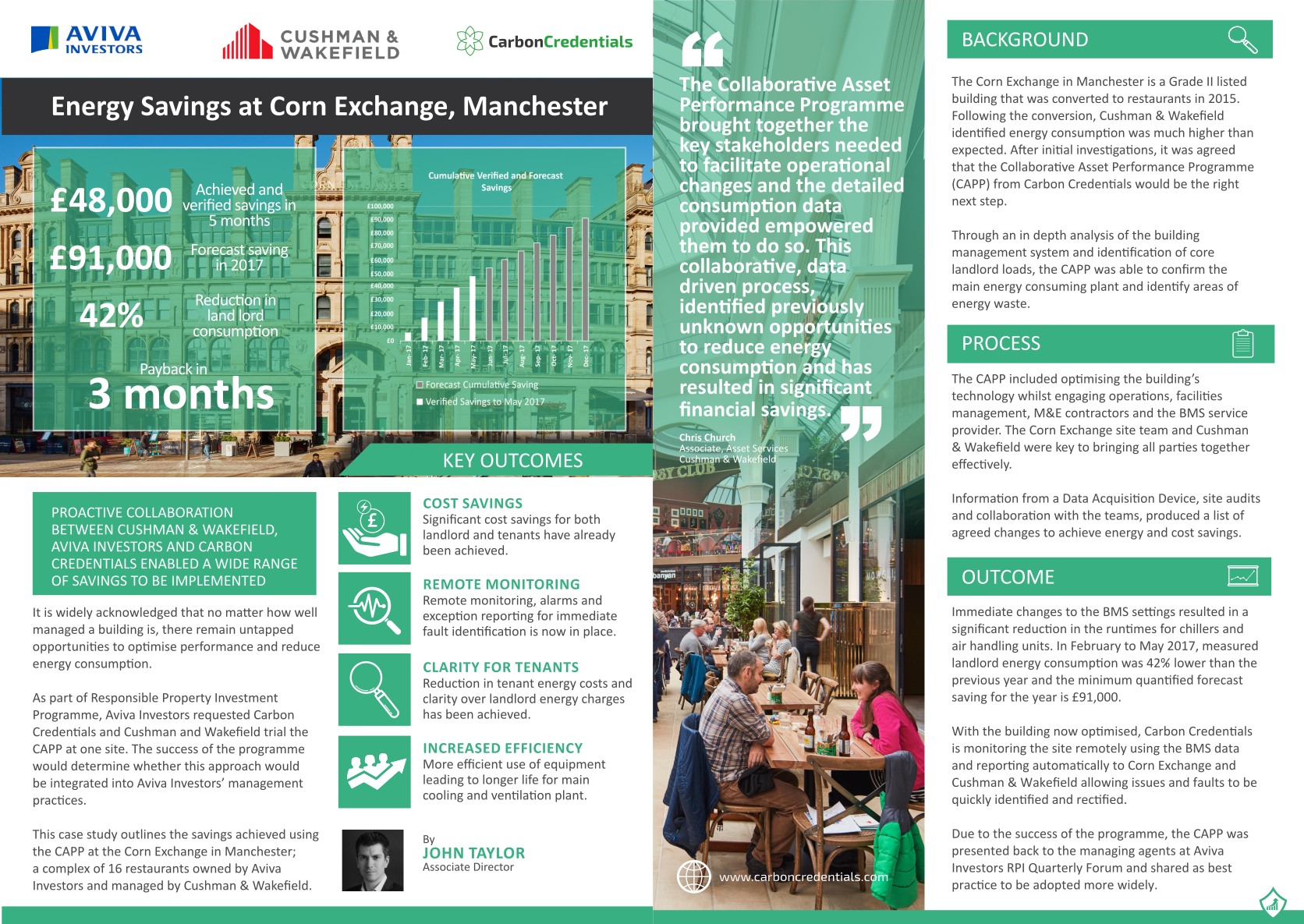This article is part of a series of selected ESG case studies submitted by participants in the 2017 GRESB Real Estate Assessment.
“The Corn Exchange was selected for this project due to its significant level of electricity consumption, amongst the highest in the AIPT portfolio. Through granular data capture, detailed analysis and collaboration we are delighted to have identified a number of opportunities to reduce consumption and produce a very significant annual saving of 10.2%.” – Chris Church (Property Manager)
Purpose of the project
The Corn Exchange is a premium casual dining venue in the heart of Manchester. It opened in May 2015 following the redevelopment of the former Triangle Shopping Centre. The property comprises a total lettable floor area of 13,684 m2 and a Tenant lineup including Gino’s’, Vapiano and Cosy Club. Phase 2 of the redevelopment, the construction of a hotel on upper floors is expected to complete in December 2017. Following the opening of The Corn Exchange it was noted that electricity expenditure was significantly higher than anticipated with a significant baseload. The electricity spend in 2016 was £872,000 (8,912,021 kWh). CAPP was undertaken to identify opportunities to reduce electricity consumption and to implement them.
Approach
In 2016 Aviva Investors appointed Carbon Credentials to undertake a Collaborative Asset Performance Programme (CAPP) at The Corn Exchange, Manchester. The process usually takes between 3-4 months and the project is now in its final stages. CAPP focuses on the optimization of technology and the engagement of people to achieve quick win low cost energy savings. The solution utilizes BMS data acquisition technology to collect building plant equipment data. CAPP establishes intelligent control of energy use by providing new visibility of plant operation and proactively identifying and achieving energy savings. Collaboration from all stakeholders is key and throughout the process engagement takes place via workshops, site meetings, calls and discussions regarding interim findings.
Implementation
The process is split into three stages, diagnostic, implementation and ongoing. The first step was a meeting on site with the key stakeholders, including the Operations Manager and M&E contractor. Following this, data acquisition devices were installed to monitor the consumption of the most energy intensive equipment connected to the BMS and a separate site audit was undertaken by a qualified engineer. The results were then presented back to the key stakeholders, including the Asset Manager and Property Manager, via a workshop. Based on the decisions taken at this workshop a number of interventions were undertaken immediately, with the results and next steps reported in March 2017.
Results
Initial findings from CAPP were presented to the key stakeholders, including the site team, Asset Manager and Property Manager, at a meeting in February 2017. This provided an opportunity to discuss the trends identified in the data captured during the diagnostic phase and the opportunities identified. A number of actions had already been undertaken where there was no cost was involved, a fault had been identified or where timings had been adjusted to measure the impact on consumption.
The CAPP recommendation report (first draft) was delivered in March 2017. The report estimates total electricity savings of £89,000.00 p.a. (and £3,000 gas) based on the interventions already made during CAPP and those recommended. This represents a 10.2% saving on the baseline electricity spend for 2016 and a payback of 0.27 years based on the net CAPP fee of £24,000. The energy saving initiatives undertaken or recommended as a result of CAPP include:
- Amending AHU run times
- Reviewing the chiller and AHU control strategies
- HV room control temperature setting raised to prevent calling for cooling from the chiller
- Over door heater run times reduced and fan speeds reduced to 50%
- Identify the cause of chiller set 2 pumps running 24/7 and rectify the problem
- Review boiler control set points The CAPP report also recommends the following next steps: • Agreeing baseline consumption figures for 2016
- Ongoing monitoring and collaboration to ensure the savings achieved are maintained
- A review of the metering arrangements – it was identified that a number of meters may be reading incorrectly
- Communicating the results to the Tenants
References
The Collaborative Asset Performance Programme (CAPP) is a service provided by Carbon Credentials. More information can be found on the Carbon Credentials website.
This case study was submitted by Aviva Investors.



